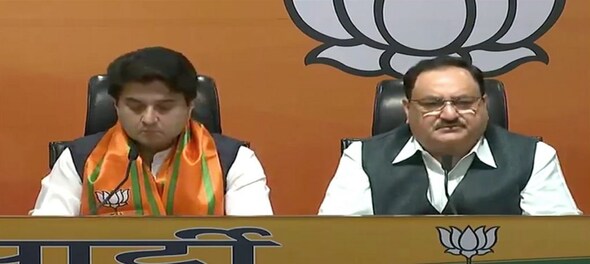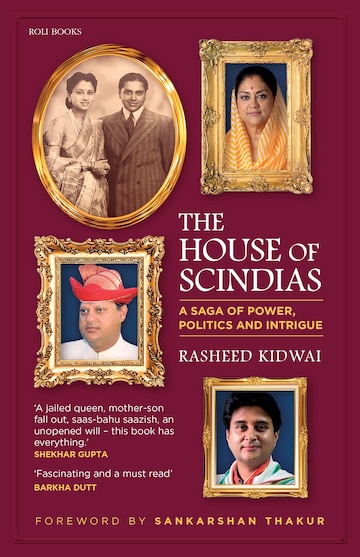
The House of Scindias: A Saga of Power, Politics and Intrigue
By Rasheed Kidwai
Price: 395/-
Publisher: Roli Books
ISBN-10: 8195124801
ISBN-13: 978-8195124800
The Scindias—be it Jyotiraditya or Vasundhara Raje or late Madhavrao—always invited attention from all and sundry. Commoners and royals both held them, albeit justifiably, in awe. After all, they are the richest and the most famous royalty that has survived the vicissitude of the turbulent times. Continuously for three centuries, the Scindias have been around and ruling, either directly their subjects or the hearts of the people, or both. In today's times, they can be dubbed as ever-green newsmakers.
Some of their stories have been too well known, for instance, about the riches they own and the fabulous palaces they built or the unseemly feud between Rajmata and Madhavrao, but many tales are still unknown, since the birth of the unique dynasty at Ujjain in Madhya Pradesh. It was founded by Ranojirao Shinde (1728) about whom not much is known, given his modest background and the early period when he ruled Malwa in Central India.

Author and journalist Rasheed Kidwai delves deeper into history to come up with a handy biographical book on the glamorous Maratha dynasty which traces its origin to Maharashtra's Satara district. Scindia, or Shinde in Marathi, had quite a listless beginning (the author notes that they did not claim descent from the moon or the sun to be called a Chandravanshi or a Suryavanshi) but they kept rising after each generation in wealth and glory. Despite very difficult times faced in the 19th and 20th century by a few of the forefathers of the present scion of the Gwalior family, Jyotiraditya Scindia, they remained in power, thanks to the valour and rare leadership abilities of incumbents like Mahadji Scindia the all-time star of the family.
In fact, the sudden joining of the BJP by Jyotiraditya, a Congress leader of about 20 years standing, last year, quickly shifted arc lights on the 'The House of Scindias'. Kidwai drew the first blood by briskly penning the 'saga of power, politics and intrigue'. There are said to be more books on the subject in the pipeline by different publishers because there is still so much to write home about.
But does this book satiate readers' curiosity about the shockingly shrouded reason behind Jyotiraditya's disillusionment with Congress? His joining the saffron party cost the century-old party its 15-month-old government in MP. It was a major setback for the Gandhi family. Kidwai, who has been a well-known Congress-watcher and has written on Sonia Gandhi and Congress two separate books, has, however, not been able to pinpoint the reason for Jyotiraditya ('the ambitious Gwalior Royal') espousing Modi and his party's philosophy. Readers definitely must be looking for that.
He has, however, explained the political situation arising out of his Guna defeat of 2019 Lok Sabha and the drying up of warm relations with the Gandhi family, especially the helpless Rahul Gandhi. The author provides enough inside information about the goings-on in Madhya Pradesh Congress and explains how Kamal Nath and Digvijaya Singh teamed up to stall Jyotiraditya in his tracks, leading to the tense relationship between the three stalwarts, two aging and one representing the youth.
In one stroke Jyotiraditya took away 22 MLAs into the BJP camp in a very secret operation in March 2020 and pulled down the Kamal Nath government. Six of the cabinet ministers also sacrificed their positions to go with their popular leader. Nath depended heavily on a confident Digvijaya's efforts which fell flat on the face as none of the MLAs, holed up in a Bengaluru resort, bothered to meet their powerful neta, the former CM of undivided MP.
That Digvijaya and Scindia were never ever close is not a secret. What, however, perplexed people was the failure of Nath, then 74, to read the writing on the wall even as Jyotiraditya, then 49, dumped Congress and walked over to BJP.
The eight-chapter book neatly describes the history from Ranoji Shinde, the personal aide of Balaji Bajirao Peshwa of Pune, to the young present generation which is yet to be known well to the people, they being far away from the public gaze—the children of Jyotiraditya or Dushyant Singh’s wife Niharika, the daughter-in-law of former Rajasthan chief minister Vasundhara Raje. The chapter related to Raje provides a general reader with some in-depth insight into the politics of Rajasthan that made her CM twice.
Well, what is so gripping about this little book? The question is obvious because there are a number of books in Hindi, English and Marathi by a number of Indian and British authors already available over the years and most recent stories have been already told. The oft-quoted book is the well-written autobiography of Rajmata Vijaya Raje Scindia who had herself lifted the veil from some of the worst-kept secrets of the dynasty, during her lifetime.
Rasheed, however, has been able to put in contemporary and political perspective the roles played by each of the famous Scindias such as Vijaya Raje, her son Madhavrao, his sister Vasundhara and of course the current flag bearer Jyotiraditya.
The author says, quoting Natwar Singh, former union minister and contemporary of the former railways minister that Madhavrao Scindia had come almost very close to prime ministership but a little before that he perished in the unfortunate air crash. There is also a significant mention in the same chapter about another Nehru-Gandhi loyalist ML Fotedar who claims to be witness to the fact that prime minister Indira Gandhi had categorically told Rajiv Gandhi that if he ever came to power, he should never make Amitabh Bachchan and Madhavrao Scindia his cabinet colleagues.
Why did she say so? This book does not answer that as Fotedar himself has not given much indication about the happening and of the conversation between the mother and son. Rasheed has also pointed to the fact that Sonia Gandhi always had Dr Manmohan Singh, the 'accidental prime minister' in her mind and when NDA was defeated in 2004, three years after Maharaj Scindia's death, she hoisted the reticent politician with meagre mass base, the PM. He remained in office for 10 years.
Drawing heavily from various second-hand sources, the book unfolds stories of each important member—Vijaya Raje, Madhavrao, two sisters and Jyotiraditya—and completes his formidable narrative of the 21-gun salute family which is known all over India and beyond it, in an interesting manner.
—The book reviewer, Abhilash Khandekar, is a senior political journalist based in Delhi.
(Edited by : Ajay Vaishnav)
Check out our in-depth Market Coverage, Business News & get real-time Stock Market Updates on CNBC-TV18. Also, Watch our channels CNBC-TV18, CNBC Awaaz and CNBC Bajar Live on-the-go!


Supreme Court says it may consider interim bail for Arvind Kejriwal due to ongoing Lok Sabha polls
May 3, 2024 4:57 PM
10% discount on fare on Mumbai Metro lines 2 and 7A on May 20
May 3, 2024 2:40 PM

